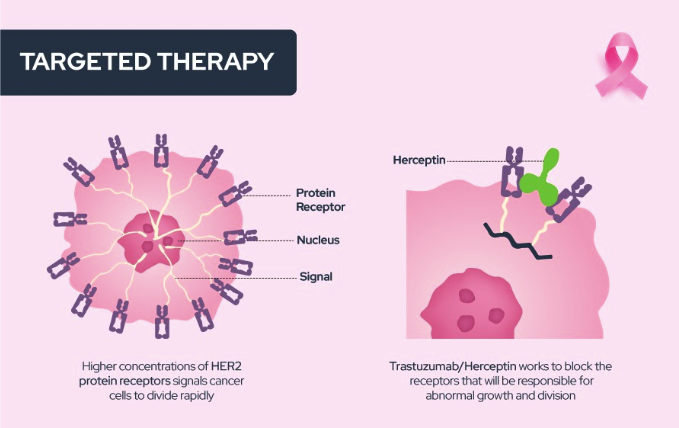
Breast cancer remains a formidable challenge in the field of oncology, necessitating continuous exploration of innovative treatment avenues. This article delves into recent trends in targeted therapy for breast cancer, shedding light on novel targets and treatment modalities that extend beyond the conventional focus on HER2 and hormone receptor-positive tumors.

Expanding Horizons: Beyond HER2 and ER/PR
Historically, HER2-positive and hormone receptor-positive breast cancers have been the primary targets for therapeutic interventions. However, recent research indicates a paradigm shift towards identifying and exploring new targetable proteins and pathways. A study published in Breast Cancer Research highlights the significance of novel targets that go beyond the traditional HER2 and ER/PR markers, paving the way for more personalized and effective treatment strategies.
The research emphasizes the need to unravel the complexities of breast cancer biology, delving into specific molecular aberrations that can serve as potential targets. By broadening the scope beyond HER2 and ER/PR, researchers aim to address the heterogeneity of breast cancer, thereby tailoring treatment approaches to the unique characteristics of individual tumors.
Reference Link:
Exploring new targetable proteins beyond HER2 and ER/PR
Harnessing the Power of Immunotherapy: CAR-T Cell Therapy
One of the groundbreaking advancements in cancer treatment is the exploration of chimeric antigen receptor T-cell therapy (CAR-T) for breast cancer. A study, published on PubMed, investigates the potential of CAR-T cell therapy in breast cancer, showcasing promising results. CAR-T therapy involves modifying a patient's own T cells to express receptors that target specific proteins in cancer cells, leading to a targeted and potent immune response against the tumor.
The research underscores the potential of CAR-T cell therapy as a revolutionary approach to breast cancer treatment, particularly for cases that may not respond adequately to traditional therapies. The ability to reprogram the immune system to recognize and destroy cancer cells opens new avenues for overcoming challenges posed by tumor heterogeneity and resistance mechanisms.
Reference Link:
CAR-T cell therapy for breast cancer
Starving Cancer Cells: Targeted Anti-Angiogenesis Agents
Angiogenesis, the formation of new blood vessels, is a crucial process for tumor growth and metastasis. Targeting this process has emerged as a promising strategy in cancer treatment. The National Cancer Institute explores the role of anti-angiogenesis agents in breast cancer treatment, providing valuable insights into ongoing research and clinical developments.
Anti-angiogenesis agents work by inhibiting the formation of blood vessels that supply nutrients to cancer cells, essentially starving the tumor. This targeted approach disrupts the tumor microenvironment, hindering its ability to thrive and proliferate. By understanding the intricacies of angiogenesis and developing specific agents to counteract it, researchers aim to bolster the arsenal of targeted therapies for breast cancer.
Reference Link:
Anti-angiogenesis agents for breast cancer
Conclusion
In the relentless pursuit of more effective breast cancer treatments, the exploration of novel targets and treatment modalities is a beacon of hope. Beyond the confines of HER2 and hormone receptor pathways, researchers are venturing into uncharted territories, uncovering new possibilities for personalized and potent therapies.
The integration of CAR-T cell therapy and the development of targeted anti-angiogenesis agents represent significant strides in the quest for improved breast cancer treatments. As research continues to unfold, the promise of more tailored and efficacious interventions comes closer to fruition.
By staying abreast of these advancements and supporting ongoing research efforts, the medical community moves closer to a future where breast cancer can be not only treated but potentially conquered through precision medicine and innovative therapies.



























